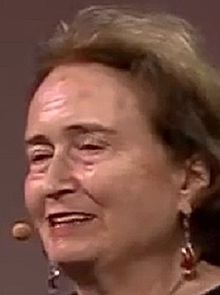Denise Kandel
| Denise Kandel | |
|---|---|
 |
|
| Born |
Denise Bystryn February 27, 1933 Paris, France |
| Nationality | United States |
| Citizenship | United States |
| Known for | Longitudinal studies on the sequence of first-time use of various legal and illegal drugs |
| Spouse(s) | Eric Richard Kandel (m. 1956) |
| Children | 2 |
| Scientific career | |
| Fields | Social medicine, Epidemiology |
| Institutions | Sociomedical Sciences and Psychiatry at Columbia University and Department of Epidemiology of Substance Abuse at the New York State Psychiatric Institute |
Denise Kandel (German: [ˈkandəl]; née Bystryn; born February 27, 1933) is an American medical sociologist and epidemiologist. She is known for her epidemiological longitudinal studies on the sequence of first-time use of various legal and illegal drugs, carried out from the 1970s until the present time (written 2016).
Kandel was born to Jewish parents who emigrated in the 1920s, before knowing each other, from eastern Poland to France to attend university. Her father Iser Bystryn (1901–1954) studied in Caen and became chief engineer in a truck factory near Paris. Her mother Sara Wolsky Bystryn (1906–2003) had to abandon her plans to study in Paris for financial reasons and learned making hats and corsets. Denise Kandel was born two years after the marriage (1930) of her parents. She had a younger brother, Jean-Claude Bystryn (1938–2010), who became a known American dermatologist and scientist at the NYU Langone Medical Center. Both parents were fluent in French, but spoke Yiddish at home.
The family lived in Colombes near Paris and Denise attended a primary school for girls (Ecole des Filles). The children grew up secularly, the family never went to synagogue, and they had presents at Christmas. In 1941, when Denise was eight, and one year after the German invasion of France during the Second World War, Denise’s father was arrested as "foreign Jew" and interned approximately 100 km south of Paris in the Nazi Beaune-la-Rolande internment camp. After some time he succeeded in fleeing to Cahors in south-western France, where could also meet his family again. While the parents – separated from each other – had to hide at changing places, the children found more stable shelter. Denise could stay as pupil in the convent Sainte-Jeanne d'Arc of Cahors until spring 1944, when she had to flee even from there and then lived with a family near Toulouse. In 1949 her family emigrated to the USA.
...
Wikipedia
